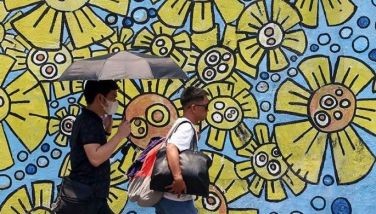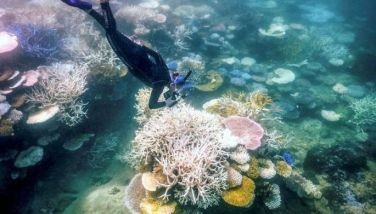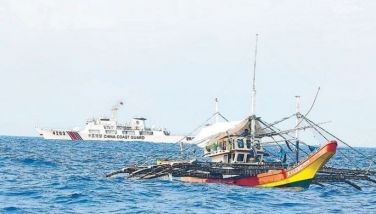RP, Malaysia worried over worsening illegal trade in turtle eggs
November 21, 2006 | 12:00am
PANGLAO, Bohol — Philippine and Malaysian environment officials and advocates yesterday expressed alarm over the worsening illegal trade in turtle eggs as they work to review a joint undertaking for the protection and conservation of the Turtle Islands located in the Sulu-Sulawesi Triangle.
Sabah Parks Director Datuk Lamri Ali said the illegal trade of turtle eggs has already reached Terrenganu on Malaysia’s northeastern coast and Brunei.
"The trade has reached a critical level such that turtle eggs from the Philippines are being smuggled into Terrenganu," said Ali, who is co-chairperson of the Joint Management Committee (JMC) for the Philippines-Malaysia Turtle Islands Heritage Protected Area (TIHPA).
"It used to be that the smuggling of the turtle eggs from the Philippines was at Sandakan," he added.
Ali was here to attend the 9th Meeting of the JMC for the Philippines-Malaysia TIHPA.
In his opening address, Ali said turtle eggs are now also being illegally traded in Brunei, where they are sold as a delicacy.
"We have a few discussions (with the Philippine side) before and we were told that the collection of turtle eggs will slowly be stopped," Ali said. "We hope to get a specific plan (on the phase-out of egg collection during the meeting)."
Protected Areas and Wildlife Bureau (PAWB) Director Dr. Mundita Lim, who is also the co-chairperson of the JMC, said the Philippine-Sabah Turtle Islands are ranked as the 11th major green turtle nesting ground in the world. This area is also one of the two remaining major nesting grounds for the endangered species in Southeast Asia.
She said the TIHPA, which is made up of nine islands lining the border between the Philippines and Malaysia, are deemed as "hotbeds" of marine turtles and compose the first trans-frontier protected area for marine turtles in the world.
She said six of the nine Turtle Islands are located within the Philippines’ jurisdiction — Boan, Langaan, Lihiman, Great Bakkungan, Taganak and Baguan, the only managed turtle sanctuary in the Philippines.
The six islands lie adjacent to the international treaty limits that separate Malaysia from the Philippines.
On the Malaysian side, Lim said, is the Sabah Turtle Islands Park composed of the islands of P. Selingaan, P. Bakkungan Kechil and P. Gulisaan.
The management of all nine islands is shared by the Philippines and Malaysia, making the conservation of habitats and sea turtles possible over the large geographic range that the two countries cover.
Lim, however, recognized the need to re-assess the joint management program for the protection and conservation of the turtles adopted by both countries in 1996.
She said the review of the joint management plan was necessary, considering the developments on the Philippine front in efforts to protect and conserve the Turtle Islands.
Lim said the joint management plan must be adjusted to take into consideration the declaration of the six Turtle Islands in the Philippines as protected areas and the enactment of Republic Act 9147 or the Wildlife Act, which prohibits the collection of turtle eggs from these six islands.
"We have to engage the community so that they will not be in the way of conservation efforts," Lim said, adding that, unlike Malaysia’s Turtle Islands, the Philippines’ Turtle Islands are populated.
"We hope that this will become part of the policies that will be adopted when the meeting does the review and come up with new specific plans," she also said.
Although the Wildlife Act should have addressed concerns about the continued collection of turtle eggs, Lim said the government has adopted a "phase-in, phase-out" scheme to facilitate a gradual shift of livelihood for affected Filipino communities in Turtle Islands.
She underscored the importance of offering livelihood options, such as eco-tourism, to the affected communities for the gradual phase-out of the illegal trade of turtle eggs to work.
"Stopping the collection of turtle eggs cannot be done totally (or) immediately. One has to take into consideration that communities depend on the collection of eggs and selling them as a delicacy," Lim said.
For now, the collection of turtle eggs is warranted and regulated under permits issued by the local governments in the islands, she said.
However, even this limited collection of turtle eggs will soon be stopped, as provided for in RA 9147, she said.
The two main species of endangered marine turtles in the TIHPA are the green turtle (Chelonia mydas) and the hawksbill turtle (Eretmochelys imbricata).
According to the World Wide Fund (WWF), 72 percent of the 14 million turtle eggs produced between 1984 and 1992 was contributed by the Philippines.
It is estimated that up to 5,400 nesters lay their eggs every year on the Turtle Islands.
Sabah Parks Director Datuk Lamri Ali said the illegal trade of turtle eggs has already reached Terrenganu on Malaysia’s northeastern coast and Brunei.
"The trade has reached a critical level such that turtle eggs from the Philippines are being smuggled into Terrenganu," said Ali, who is co-chairperson of the Joint Management Committee (JMC) for the Philippines-Malaysia Turtle Islands Heritage Protected Area (TIHPA).
"It used to be that the smuggling of the turtle eggs from the Philippines was at Sandakan," he added.
Ali was here to attend the 9th Meeting of the JMC for the Philippines-Malaysia TIHPA.
In his opening address, Ali said turtle eggs are now also being illegally traded in Brunei, where they are sold as a delicacy.
"We have a few discussions (with the Philippine side) before and we were told that the collection of turtle eggs will slowly be stopped," Ali said. "We hope to get a specific plan (on the phase-out of egg collection during the meeting)."
Protected Areas and Wildlife Bureau (PAWB) Director Dr. Mundita Lim, who is also the co-chairperson of the JMC, said the Philippine-Sabah Turtle Islands are ranked as the 11th major green turtle nesting ground in the world. This area is also one of the two remaining major nesting grounds for the endangered species in Southeast Asia.
She said the TIHPA, which is made up of nine islands lining the border between the Philippines and Malaysia, are deemed as "hotbeds" of marine turtles and compose the first trans-frontier protected area for marine turtles in the world.
She said six of the nine Turtle Islands are located within the Philippines’ jurisdiction — Boan, Langaan, Lihiman, Great Bakkungan, Taganak and Baguan, the only managed turtle sanctuary in the Philippines.
The six islands lie adjacent to the international treaty limits that separate Malaysia from the Philippines.
On the Malaysian side, Lim said, is the Sabah Turtle Islands Park composed of the islands of P. Selingaan, P. Bakkungan Kechil and P. Gulisaan.
The management of all nine islands is shared by the Philippines and Malaysia, making the conservation of habitats and sea turtles possible over the large geographic range that the two countries cover.
Lim, however, recognized the need to re-assess the joint management program for the protection and conservation of the turtles adopted by both countries in 1996.
She said the review of the joint management plan was necessary, considering the developments on the Philippine front in efforts to protect and conserve the Turtle Islands.
Lim said the joint management plan must be adjusted to take into consideration the declaration of the six Turtle Islands in the Philippines as protected areas and the enactment of Republic Act 9147 or the Wildlife Act, which prohibits the collection of turtle eggs from these six islands.
"We have to engage the community so that they will not be in the way of conservation efforts," Lim said, adding that, unlike Malaysia’s Turtle Islands, the Philippines’ Turtle Islands are populated.
"We hope that this will become part of the policies that will be adopted when the meeting does the review and come up with new specific plans," she also said.
Although the Wildlife Act should have addressed concerns about the continued collection of turtle eggs, Lim said the government has adopted a "phase-in, phase-out" scheme to facilitate a gradual shift of livelihood for affected Filipino communities in Turtle Islands.
She underscored the importance of offering livelihood options, such as eco-tourism, to the affected communities for the gradual phase-out of the illegal trade of turtle eggs to work.
"Stopping the collection of turtle eggs cannot be done totally (or) immediately. One has to take into consideration that communities depend on the collection of eggs and selling them as a delicacy," Lim said.
For now, the collection of turtle eggs is warranted and regulated under permits issued by the local governments in the islands, she said.
However, even this limited collection of turtle eggs will soon be stopped, as provided for in RA 9147, she said.
The two main species of endangered marine turtles in the TIHPA are the green turtle (Chelonia mydas) and the hawksbill turtle (Eretmochelys imbricata).
According to the World Wide Fund (WWF), 72 percent of the 14 million turtle eggs produced between 1984 and 1992 was contributed by the Philippines.
It is estimated that up to 5,400 nesters lay their eggs every year on the Turtle Islands.
BrandSpace Articles
<
>
- Latest
- Trending
Trending
Latest
Trending
Latest
Recommended






























